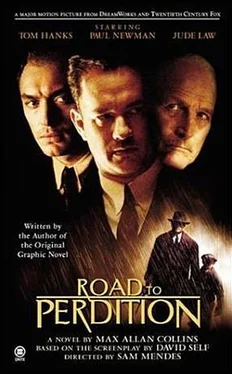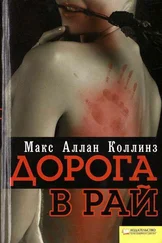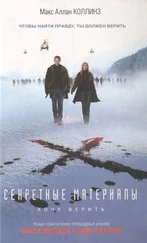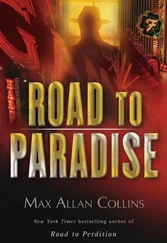Carrying case in hand, cartridge drums stuffed under an arm, O’Sullivan shut the cupboard up, relocked it, walked to the garage doors, which he swung open; he got into the front seat, behind the wheel, reaching back to place the black case on the floor next to the rear seat, setting the drum-style magazines atop it. Then he started up the vehicle and the green Ford sedan rolled out into the light rain. He paused only to get out and close the garage doors again, unaware that — in the back of the car, inside the compartment under the rear seat — his son Michael, Jr., had stowed himself away.
The rain began to gather intensity, at first tap-dancing on the roof of the Ford, then drumming on it. O’Sullivan drove slowly — the streets were wet and slick, their surface a black mirror throwing streetlamp glow and the headlights of other cars back at him. Still, it took less than ten minutes to guide the Ford from the O’Sullivans’ residential neighborhood to the downtown of Rock Island.
When O’Sullivan pulled up in front of the Florence Hotel, Connor Looney was waiting, watching, just inside the lobby doors. The lanky Connor — in a black raincoat, his fedora snug — ran to the car, as if he could beat the rain there; and practically threw himself into the front seat.
“You’re late,” he said.
“I’m early,” O’Sullivan said.
As the car pulled away from the curb, Connor checked his watch. “Damn thing must be running fast... Or maybe it’s just me.”
O’Sullivan glanced at Connor, who added, “I live for this.”
They were less than five minutes away from the warehouse district, even in this weather.
“Hell of a night,” Connor said.
O’Sullivan threw him a hard look. “We’re just going to talk, remember?”
Connor glanced in back. “Is that why you brought your violin?”
O’Sullivan said nothing.
“You just like to be prepared,” Connor said. “Like all Boy Scouts.”
For a minute or so, the only sound was the wheels on wet pavement, the patter of raindrops on the roof, and the sloshing of gathered water in gutters.
“Man lost his brother,” O’Sullivan said. “We settle him down. Tell him what he wants to hear. And move on.”
“’Course. But let’s not talk his ear off, drag this out all night — I got to get myself back downtown. There’s some skirts need liftin’.” The sleepy-eyed Connor plucked a flask from inside his dark topcoat. “Want a snort?”
O’Sullivan shook his head. The last thing Connor needed was a snort — O’Sullivan could tell this one wasn’t the man’s first of the night. But at least the volatile younger Looney appeared to be in an even temper. Right now he was singing, “T’aint Nobody’s Business If I Do,” which even made O’Sullivan smile, a little.
As the Ford jostled over the slick streets, the lid of the rear seat lifted, slightly, and the boy hidden away in the compartment got an inadvertent glimpse of the hard black carrying case resting on the floor, stuffed between the seats. The boy had only seen the inside of that case once, when — spying with Peter on their father — he’d watched Papa open it and assemble the parts within into a fearsome weapon.
He knew it was what the G-men on the radio and at the movies and in the funnies called a “tommy” gun — why its name was Tommy, the boy had no idea. Stuffy inside the cubbyhole, he pushed the lid up, just enough to let in some air — but also to have another look at that hard-shell case before him... knowing what lay within.
Up in the front seat, Papa was driving and Uncle Connor was riding — Michael had recognized the unpleasant man’s voice all too readily. They weren’t talking anymore, though Uncle Connor was singing a jazz song; he seemed in a good mood.
Sitting on top of the hard-shell case were two round metal canisters — each about the size of a can of tuna fish, maybe a little bigger, bouncing a little as the car rolled over the pavement and its occasional potholes. The canister had something to do with the tommy gun — that time he and Peter had seen Papa assembling the weapon, the drum had been the last puzzle piece to get locked in place.
Michael was pretty sure the canister had something to do with bullets. He lifted the seat lid a few more inches; the canisters, jostling gently with the rhythm of the car, were easily within his reach... he could take one and look at it for a second and put it back, no one the wiser...
That was when his father took a corner a shade sharp, and one of the canisters slipped off the black case, hitting the floor with a metallic klunk . With one hand on the wheel, and both eyes on his driving, Papa reached his other hand back, and Michael let the lid softly shut, not seeing his father fishing for the case, finding it, steadying it.
Connor asked, “Want me to get that... ?”
“No,” Papa said. “It’s all right.”
Again the boy lifted the lid slightly, peeked out, and saw the tommy gun canister balancing on end, like a little wheel, on the floor next to the case. His father’s hand found the other canister, atop the case, and was now feeling around for the other one.
Michael reached for the canister, to put it back where his father would expect to find it, only the drum began to roll, with every bump of the road. Finally, as his father took another corner, the canister glided into Michael’s grasp!
The thing was heavy, much heavier than Michael had ever imagined, but he managed to put it back on top of the hard-shell case.
But as he drew his hand away, ready to slip back down into the darkness of his hideaway, Michael noticed a slot in the circular can: a bullet was showing! He’d been right — it was bullets, bullets for the tommy gun... and reaching out tentatively with a forefinger, like every child who ever touched a hot stove, the boy put his fingertip against the cold metal of the bullet...
... and the bullet popped out!
He caught it, watching as another bullet jumped into the slot. With his shoulder, he kept the lid up an inch or so, to let in enough light to see his prize. The bullet in his palm was two shades of metal; the Lone Ranger used silver bullets, but this bullet was made of something else.
Its lights doused, the Ford pulled down a narrow alley between brick buildings in an industrial area, though the boy — tucked away in his dark box under the backseat, his father’s bullet tight and cold in his clenched hand — didn’t know that. All he knew were sounds, like the hammering of rain on the Ford’s metal roof, and the slice of sight he gave himself by lifting that lid a crack.
Then the car rolled to a stop, and Michael heard first Connor’s door opening and closing, then his Papa’s, footsteps slapping at water-pooled pavement. And the back door opened, his father leaning in.
Michael eased the lid shut, returned to the womb of darkness, shivering, not just with the cold of the night.
The boy could hear that hard-shell case snapping open, followed by mechanical clicks and scrapes and clacks of machine-made parts fastening into other metal parts. That last metallic crack, Michael just knew, was that canister of bullets snapping on, like a terrible, wonderful period on the end of a sentence.
Then that was followed by another sharp closure — the back door shutting — making Michael flinch in his cubbyhole. The boy knew he shouldn’t be here — even sensed, to some small degree at least, the foolhardy dangerousness of his own mission. But he was nonetheless as thrilled as he was frightened. What brave thing was his father doing on this dark rainy night? What injustice was he righting?
Michael waited forever — perhaps as long as a minute — and pushed up the seat lid and pulled himself out from the seat, staying low. The sound of raindrops assailing the Ford was louder out here, like God had his own tommy gun. Peeking over the front seats, the boy looked out the rain-streaked windshield into the night.
Читать дальше












